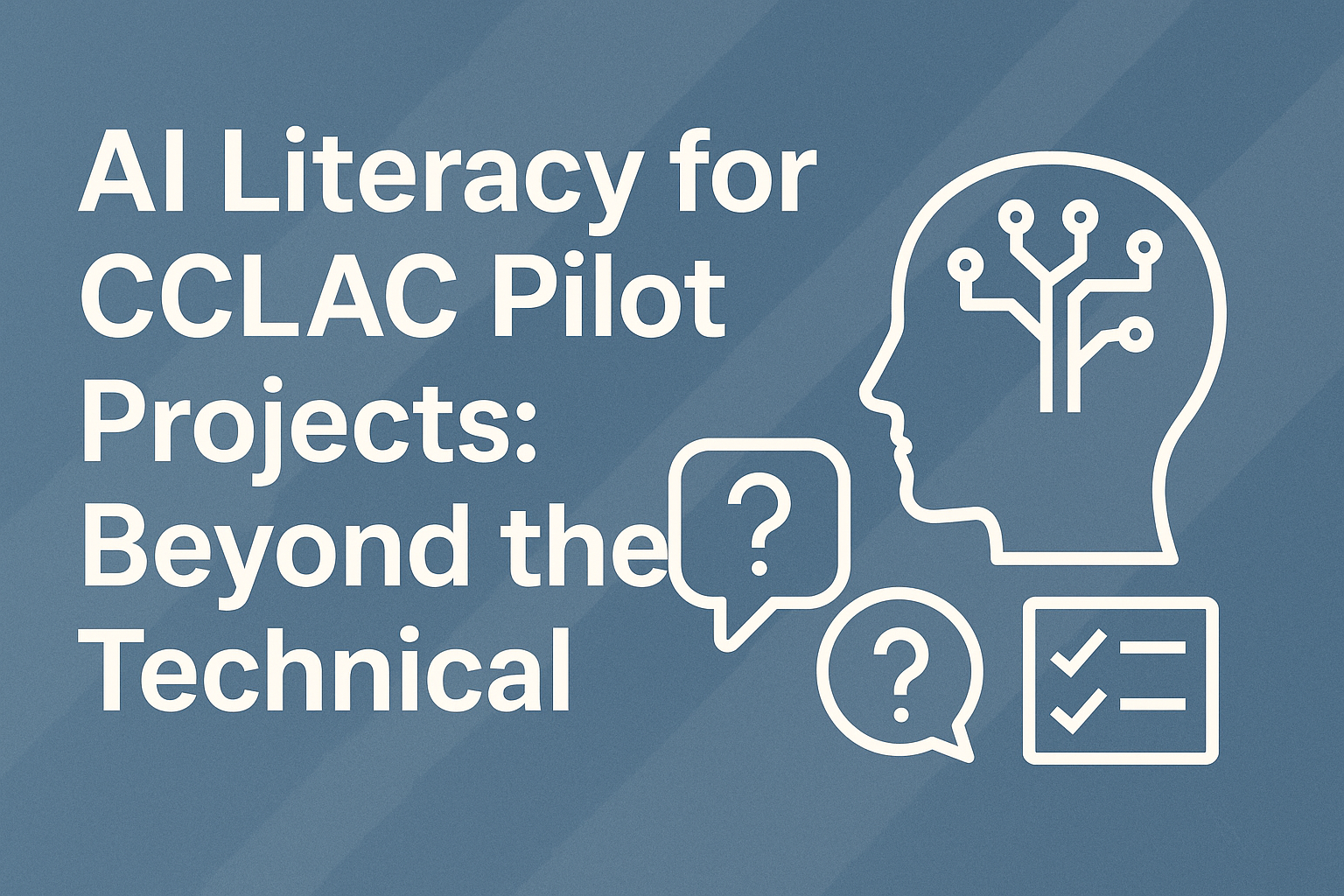
Introduction: Why AI Literacy Matters for Our Mission
When we talk about AI literacy, the conversation too often begins and ends with technical skills like writing prompts or understanding how to operate the latest tool. While these skills have value, they only scratch the surface.
For CCLAC’s ongoing pilot projects, AI literacy must be a critical and cultural practice. An approach that goes deeper than technical know-how, empowering participants to think critically, act ethically, and make discerning choices about how (and when) technology should be used.
This mindset directly supports CCLAC’s mission: building informed, engaged, and values-driven citizens who can shape the future of their communities.
From Technical Proficiency to Ethical Discernment
We’re not here to create machine operators for today’s tools. We’re here to nurture individuals who can question, challenge, and choose. That means fostering skills that endure even as the technology changes:
-
Critical Thinking: Asking why a tool works the way it does, not just how to use it.
-
Ethical Reasoning: Considering the broader social and moral impact of using a given AI tool.
-
Sound Judgment: Recognizing situations where AI should not be used at all.
Key questions every participant should be encouraged to ask:
-
Who built this tool?
-
Whose values are embedded in it?
-
When might it be wiser not to use AI at all?
Reference: The OECD’s AI Literacy Framework highlights that the highest level of AI literacy is the ability to assess appropriateness, fairness, and trustworthiness of AI systems, not just their functions (OECD, 2022).
The Role of “Unplugged” AI Literacy
True AI literacy isn’t confined to a screen. In fact, some of the most valuable lessons can be taught without ever logging in. These “unplugged” activities strip away the novelty of the tool and focus on the human skills that make technology meaningful or dangerous.
By integrating unplugged approaches into our pilot projects, we:
-
Reinforce that technology is a choice, not a default.
-
Make the learning accessible to those with limited device or internet access.
-
Build resilience against technological dependency.
Three Unplugged Strategies for CCLAC Pilots
1. Bias Mapping Game
Purpose: Help participants uncover how biases can be embedded in tools and processes.
How to Apply: Create a fictional AI scenario relevant to your pilot (e.g., an “Urban Tree Planting Bot” for environmental stewardship). Provide a backstory and let participants identify potential biases and role-play outcomes.
Tools & Methods:
-
Whiteboards or sticky notes for mapping bias points.
-
Method inspiration: The Harvard Implicit Bias framework (Project Implicit).
2. Human-AI Debate Simulation
Purpose: Explore the boundaries between AI-generated decisions and human judgment.
How to Apply: Divide participants into “AI Advisors” (using rigid rules) and “Human Advisors” (considering ethics and context). Assign a decision-making task relevant to your project.
Tools & Methods:
-
Role-play guidelines printed in advance.
-
Decision-making flowchart templates (can be made in Miro or Lucidchart).
3. Media Provenance Detective
Purpose: Build skills for verifying the credibility of information and sources.
How to Apply: Present participants with mixed media, some authentic, some fabricated or edited. Have them work in teams to identify trustworthy vs. questionable items.
Tools & Methods:
-
Printed media cards with source clues.
-
Reference approach: News Literacy Project’s Checkology.
Digital Features on Incubator.org
That Complement Unplugged Learning
While the unplugged strategies form the foundation of our AI literacy approach, the real power comes from bringing those in-person experiences back into Incubator.org’s digital space where they can be documented, expanded, debated, and analyzed in a secure, private, and ad-free environment.
Here’s how our own platform features can extend and enrich unplugged learning:
Blogs: Capturing the Story
After running an unplugged activity in a CCLAC pilot project, facilitators and participants can create blog posts that document:
-
What the activity involved.
-
Key moments, discoveries, and challenges.
-
Participant quotes or photos (with consent).
This transforms a one-time exercise into a permanent learning resource for the community and supports ongoing reflection.
Discussions: Continuing the Conversation
The Discussions area acts as our structured debate and reflection space similar in purpose to platforms like Kialo, but fully integrated and member-driven.
-
Post follow-up questions from an unplugged activity.
-
Invite diverse perspectives from across the network.
-
Use threaded replies to capture nuanced dialogue.
This makes it possible for members who were not in the room to still contribute to the learning process.
Courses: Structuring and Scaling Learning
When an unplugged activity proves successful, it can be transformed into a course module within Incubator.org’s Courses application.
-
Include facilitator notes, downloadable materials, and reflection prompts.
-
Add short quizzes or self-assessment tools.
-
Issue completion certificates to participants.
This formalizes learning pathways and allows future groups to replicate proven approaches.
Data Studio: Measuring Impact & Capturing Insights
Our Data Studio serves as the ethical, private alternative to external analytics tools.
-
Create surveys before and after unplugged activities to measure changes in understanding, attitudes, or confidence.
-
Gather both quantitative metrics (scores, ratings) and qualitative insights (open-ended feedback).
-
Visualize results with charts, graphs, and comparative reports fully contained in our secure space.
This ensures our evaluation data supports continuous improvement without compromising privacy.
Why This Matters:
By using Incubator.org’s internal tools to complement unplugged learning, we:
-
Keep the intellectual property and participant data within our trusted community.
-
Turn real-world experiences into reusable learning resources.
-
Create a transparent record of our collective growth over time.